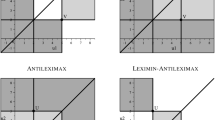Summary
In examining thevon Neumann-Morgenstern axioms for a cardinal utility measure, ProfessorGeorgescu-Roegen comes to the conclusion that it is not the Strong Independence Axiom which causes difficulties, as had been supposed by several authors, but an ordinalist assumption, namely, that there always exists an ordinal utility function. This assumption is called the ordinalist fallacy. By using a Mengerian hierarchy of wants, ProfessorGeorgescu-Roegen shows that there exists a realistic case for which the alternatives are not ordinally measurable. In this note it is pointed out that this situation can only occur if one insists that a utility function cannot be defined on anything less than the real number system. If one is satisfied with commodity combinations that are represented in terms of rational numbers, then there is no fallacy. It is suggested that the rational numbers are necessary and sufficient as a numerical domain for the foundation of economics as a quantitative science. If a utility function is defined on rational numbers, a cardinal measure can be postulated for hierarchies of wants.
Zusammenfassung
ProfessorGeorgescu-Roegen stellte nach einer Untersuchung dervon Neumann-Morgensternschen Axiome der Kardinalmessung fest, daß die Hauptschwierigkeit dieses Maßes nicht das Starke Unabhängigkeitsaxiom ist, wie verschiedentlich behauptet wurde, sondern die Annahme, daß immer eine Ordnungsfunktion existiert.Georgescu-Roegen bezeichnet diese Annahme als den Ordinalfehler. Er postuliert eineMengersche Bedürfnishierarchie und zeigt, daß es einen einfachen Fall gibt, für den die Alternativen nicht ordinal meßbar sind. In der vorliegenden Arbeit wird darauf hingewiesen, daß eine solche Situation nur dann möglich ist, wenn man darauf besteht, daß eine Nutzenfunktion auf den reellen Zahlen definiert sein muß. Wenn man sich begnügt, Anordnungen auf den rationalen Zahlen zu definieren, dann gibt es keinen Ordinalfehler. Es wird behauptet, daß die Menge der rationalen Zahlen ausreicht, um die Wirtschaftswissenschaft als quantitative Wissenschaft zu begründen. Für eine Nutzenfunktion, die sich auf die rationalen Zahlen bezieht, kann ein Kardinalmaß postuliert werden, da das Archimedische Axiom und dasDubois-Reymondsche Linearitätsaxiom ohne weiteres erfüllt sind.
Résumé
Après avoir examiné les axiomes du mesurage cardinal de l’utilité devon Neumann-Morgenstern, le professeurGeorgescu-Roegen a conclu que la difficulté principle de cette mesure ne reste pas dans l’axiome fort d’indépendance comme il a quelquefois été prétendu, mais plutôt dans l’hypothèse qu’il existe toujours une function d’utilité ordinale, ce qu’il appelle l’erreur ordinaliste. En établissant une hiérarchie de besoins Mengérienne, il montre qu’il y a un cas réaliste où les alternatives ne sont pas accessibles à un mesurage ordinal. Dans le présent article il est démontré qu’une telle situation n’est possible que dans le cas où l’on postule qu’une fonction d’utilité être fondée sur les nombres réels. Lorsqu’on se contente de ranger les combinaisons de biens dans l’échelle des nombres rationnels il n’y a pas d’erreur ordinaliste. Il est suggéré que l’ensemble des nombres rationnels soit suffisant pour établir la science économique en tant que science quantitative. Pour une fonction d’utilité qui se réfère aux nombres rationnels, une mesure cardinale peut être acceptée puisque l’axiome d’Archimède et l’axiome de linéarité deDu Bois-Reymond sont plausibles.
Резуме
Анализируя аксиомы фон Неймана-Моргенщтерна для кардинальной меры полезности, профессор Джорджеску-Реген придет к выводу, что трудности не заключаются в аксиоме о сильной независимости как предпологают некоторые авторы но в допушении, что всегда сушествует порядковая функция полезности. Ёто допушение называется порядковым заблюждением. На основе иерархии потребностей Менгера профессор Джорджеску-Реген доказывает, что сушествует реальный случай, в котором альтернативы порядковым способом неизмеримы. В данной работе указывается на то, что такая ситуация возможна только тогда, когда настаивают на том, что функция полезности может быть определена только множеством реальных чисел. Если ограничиваемся комбинациями товаров, представленными рациональными числами, выще упомянутого заблюждения нет. Предпологается, что рациональные числа необходимы и достаточны для обоснования Экономических наук как количественной науки. Если функция полезности определена рациональными числами, кардинальная мера может быть постулирована для иерархии потребностей.
Similar content being viewed by others
References
Birkhoff, G. [1948], Lattice Theory. Providence, Rhode Island: American Mathematical Society Publication, 1948.
Cantor, G. [1882], Über unendliche, lineare Punktmannigfaltigkeiten. Mathematische Annalen, Bd. 20 (1882).
Du Bois-Reymond, P. [1882], Die Allgemeine Funktionentheorie. Tübingen: Verlag der H. Laupp’schen Buchhandlung, 1882.
Fichera, G. [1954], Lezioni sulle transformazioni, VI. Roma: Libreria Eredi Virgilio Veschi, 1954.
Fraenkel, A. [1946], Einleitung in die Mengenlehre. Dover 1946.
Gauss, C. F. [1900], Letter to Schumacher, Werke, VIII. Leipzig: B. G. Teubner, 1900.
Georgescu-Roegen, N. [1966], Analytical Economics. Cambridge, Mass.: Harvard University Press, 1966.
Helmholtz, H. von [1895], Zählen und Messen, erkenntnistheoretisch betrachtet. Wissenschaftliche Abhandlungen, Vol. III, p. 356–391, Leipzig: J. Barth, 1895.
Menger, C. [1950], Principles of Economics. Glencoe, Ill.: The Free Press, 1950.
Probleme der Wertlehre [1931]. Edited byL. Mises andA. Spiethoff. München-Leipzig: Duncker & Humblot, 1931.
Russel, B. [1938], Principles of Mathematics. New York: W. W. Norton & Co., 1938.
Author information
Authors and Affiliations
Rights and permissions
About this article
Cite this article
Enzer, H. The ordinalist fallacy. Statistische Hefte 9, 101–107 (1968). https://doi.org/10.1007/BF02923543
Issue Date:
DOI: https://doi.org/10.1007/BF02923543




